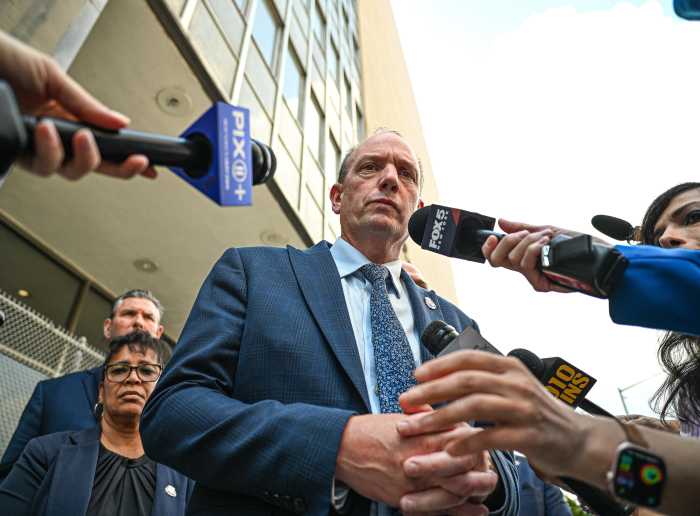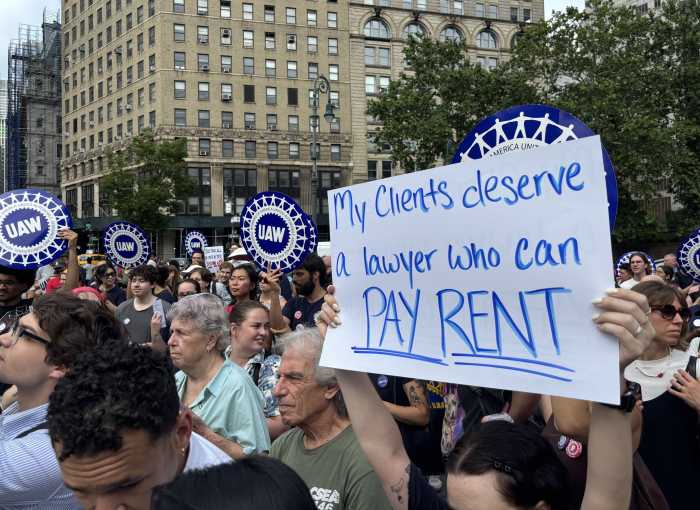BY ALICIA GREEN | Over two million people lined Fifth Avenue and clogged Village sidewalks for June 28’s Heritage of Pride March — always an occasion for solidary and celebration, but especially this year, having taken place just two days after the landmark SCOTUS ruling in favor of same-sex marriage. We spoke with paradegoers about what the decision means to them.
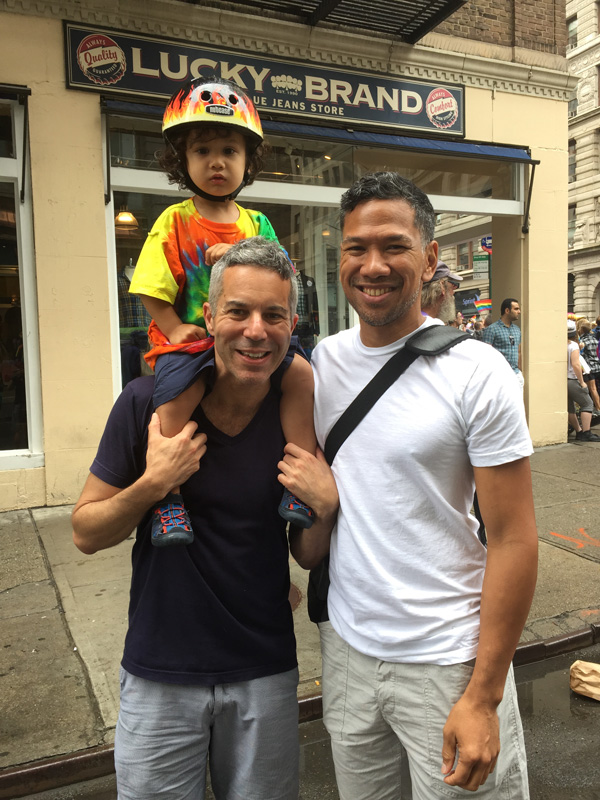
BRIAN AND ADAM
Married for 3 years, together for 19
Q: How do you feel about the Supreme Court’s decision on same-sex marriage?
ADAM: Now that we are parents, it means that our son will grow up with a greater feeling of the legitimacy of his family, and we will feel better about traveling to other states.
BRIAN: Our parents are in Texas, and Texas not being one of the states where you could previously be married…we were so concerned just about basic rights and being able to be together in a car from point A to point B and not getting pulled over — or what if something happened that put either of us in a hospital? So now that we have the thousand-plus rights, in any other city we want to go to, we’d be protected.
Q: What do you think this means for the modern gay rights movement?
ADAM: I think the struggle is not over, but the focus can now change a little bit. It’s important for everyone to remember how much effort it took from so many different people to get to where we are.
BRIAN: And I’m not sure it’s considered a modern gay movement anymore, because I think of queer culture and really the larger rainbow [including bisexuals and transgenders]. It’s so fluid now. So I think the idea of what’s modern and being called gay is a lot more fluid and larger than how we knew it when we were much younger. It’s very exciting to see such a dynamic shift and to be a part of that just by living in this world as it is now.
Q: And how old is your son?
A: Milo is exactly two and a half years today.
JOSIE (identifies as a transsexual female)
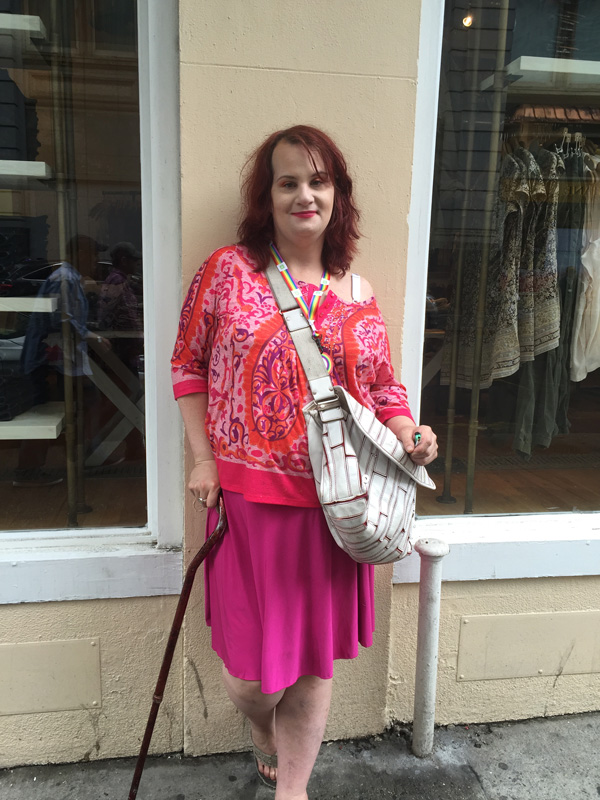
Q: Where were you when the Supreme Court announced its decision?
A: Probably sleeping in bed. I didn’t find out until I went on Facebook ‘cause I don’t have a TV.
Q: What was your reaction?
A: I think it’s about time they stepped up. I mean we’re in 2015. People are getting married. People just want to be happy. We should be able to marry who we want to. As a transsexual, I should be able to marry who I want to. And the thing is people think that there are [only] heterosexual transsexuals. There’s homosexual transsexuals too.
Q: And what is a homosexual transsexual?
A: [Someone who] likes…other transgenders or likes women or men, depending on how trans they are.
Q: What are some other concerns that need to be addressed for the LGBT community now that marriage equality is possible?
A: Now that marriage equality is possible, they need to get back to the transgender reality. The fact that we don’t have rights. The fact that because we look different and we sound different we’re not allowed to go to the proper bathroom, which now they’re making gender-neutral bathrooms. But they need to get back on that [and] then they need to get back on education.
BETH AND CATHERINE
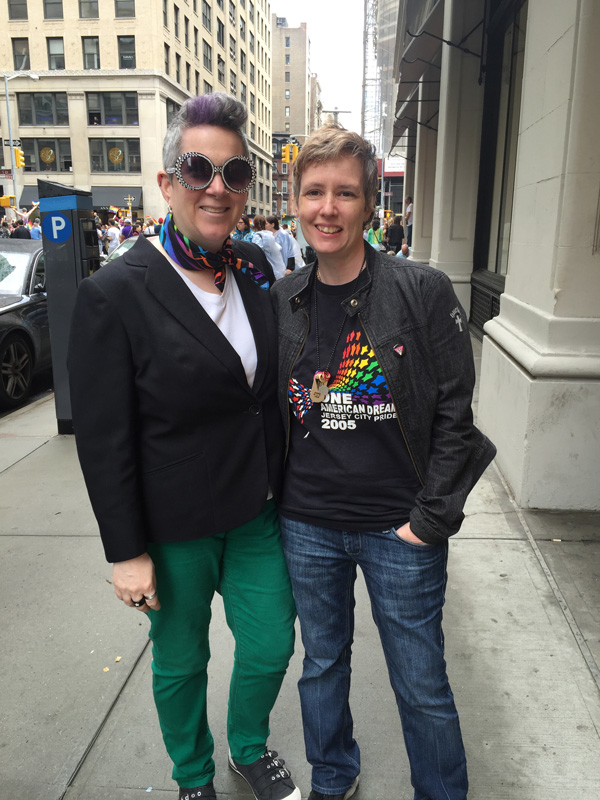
Q: How long have you two been together?
CATHERINE: 12 years.
BETH: 13.
CATHERINE: Oh! 13. There you go. Typical married answer. One gets it right, one doesn’t [laughs].
Q: How long have you been married?
BETH: We got married this past March. It was cool. We did become domestic partners in 2004 when it became legal to do that.
CATHERINE: In New Jersey. So we were the first couple in our town of Jersey City to become the first domestic partners in 2004.
Q: How do you feel about the Supreme Court ruling?
CATHERINE: Before that, we would always try to explain to people that although we were domestic partners, and even once we were married, it’s great when we’re in our own state — but once we travel, we are just two friends in a car. God forbid if anything should happen, we would have to rely on whoever happened to help us, if they were an ally or not. And now that’s not the case. Now we have the same rights as every other married couple, and burdens, and we pay the same taxes, so I think that legally it’s a long time coming. We’re very happy about it.
BETH: I don’t think that people realize that the young gay people couldn’t dream about their marriage ceremony. A lot of young ladies always dream about their big wedding. I think probably girls more than guys. But to actually think that they can have that dreaming when they’re young because they know that they can do it anywhere they want across this country…I think that’s great.
DARREN AND TOM
Together 39 years, married for 7
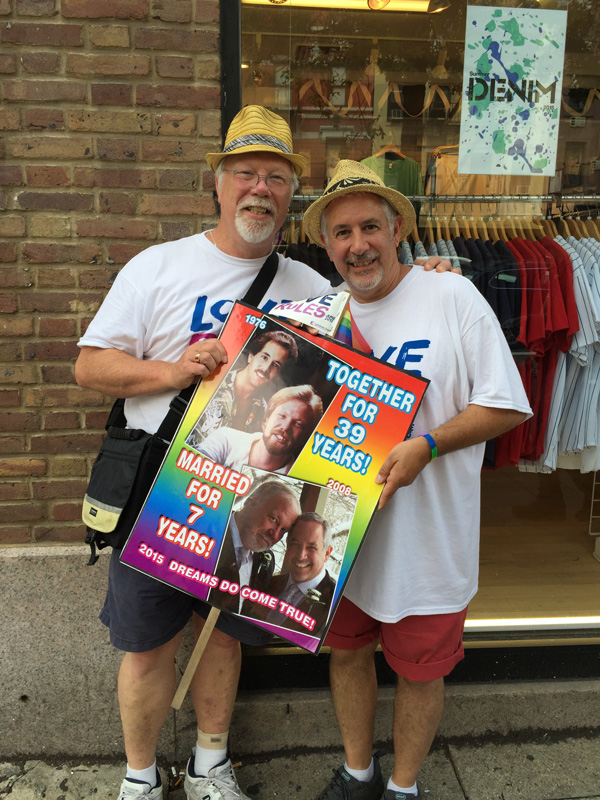
Q: What was your initial reaction to the Supreme Court ruling?
TOM: Shock and overjoyed. It just all of a sudden hit you like a brick wall that it happened. We’re there.
DARREN: I cried. It has been a long, long battle that we fought so long to have our families respected and to have our relationships respected. So many people have been working so long, so hard. It was just the culmination of that incredible fight that so many people have done.
Q: Did you face any challenges when you wanted to get married?
DARREN: The ironic thing for us is we both came from performing backgrounds. We had a lot of straight friends. We’ve had very little problems. And we’ve lived either in Los Angeles or New York, so we lived in two very liberal cities.
TOM: So our problems were few. What affected us most was when the AIDS crisis started and then we ended up losing so many friends. That was our big turmoil that we had to face and deal with.
DARREN: We’ve talked this weekend about how much we think of them, especially having had conversations ten years ago with friends that said marriage would never happen. We certainly have thought of them and how much this means. And in a very strange way with the funeral [of Reverend Clementa Pinckney] this Friday, it just shows us how much work we have left to do for the other minorities — whether its people of color, whether its transgender, whether its women, ageism, sexism. There’s still a lot of work to do. But it gave me incredible hope that it could be done. I figured if this could be done, we can get through anything.
Q: What are some other concerns that need to be addressed for the LGBT community?
TOM: There’s still discrimination where so many gay, lesbian and transgender [people] could be fired from their jobs, can not get housing…things like that. Even though we may have marriage equality, we’re still not equal.
DARREN: It charged my batteries. This battle’s been fought for us. We can fight and help other people that need the same thing.
GERARDO
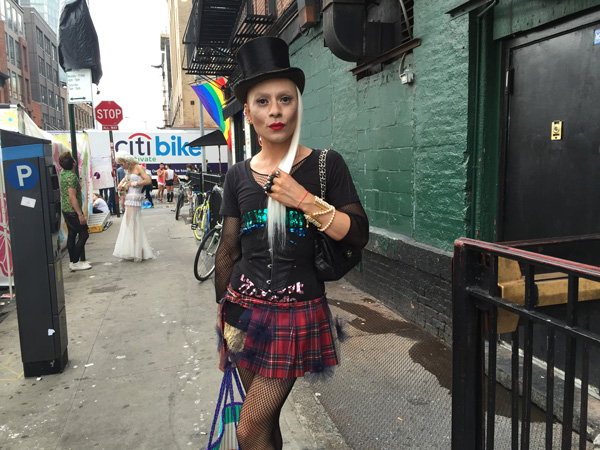
Q: Is that your drag name as well?
A: That’s my original name. But you know that’s me. I’m not like anyone so I have to use my real name. Some people think that I should use a stage name, but I’m fine with my birth name.
Q: Why did you get into drag?
A: Expressing myself. I think it’s something that I have to do. I like art so this is a way of doing it. Sometimes, I wear a tie. Sometimes, I wear a suit. I don’t think clothes should have gender.
Q: Did you ever see yourself getting married?
A: Yes, of course.
Q: How do you feel about the Supreme Court decision to legalize same-sex marriage in all 50 states?
A: Now we have the option. My ex didn’t marry me ‘cause at the time I didn’t have the opportunity to do it. But now it is the opportunity.
Q: And how does that make you feel?
A: I think he has to do it. I have so many rings. I don’t know which one I’m going to pick [laughs].




